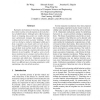Free Online Productivity Tools
i2Speak
i2Symbol
i2OCR
iTex2Img
iWeb2Print
iWeb2Shot
i2Type
iPdf2Split
iPdf2Merge
i2Bopomofo
i2Arabic
i2Style
i2Image
i2PDF
iLatex2Rtf
Sci2ools
JOIN
2006
2006
Local Detection of Selfish Routing Behavior in Ad Hoc Networks
Reputation mechanisms for detecting and punishing free-riders in ad hoc networks depend on the local detection of selfish behavior. Although naive selfish strategies based on dropping data packets are readily detected, more sophisticated strategies that manipulate ad hoc routing protocols present a greater challenge. In this work we develop a method to distinguish selfish peers from cooperative ones based solely on local observations of AODV routing protocol behavior. Our approach uses the finite state machine model of locally observed AODV actions to build up a statistical description of the behavior of each neighbor. We apply a series of wellknown statistical tests to features derived from this description to partition the set neighboring nodes into a cooperative and selfish class. Simulation results for a non-mobile ad hoc network show that our approach can detect two different types of routing manipulation while maintaining a low rate of false positives.
Ad Hoc | Ad Hoc Network | JOIN 2006 | Selfish |
| Added | 13 Dec 2010 |
| Updated | 13 Dec 2010 |
| Type | Journal |
| Year | 2006 |
| Where | JOIN |
| Authors | Bo Wang 0001, Sohraab Soltani, Jonathan K. Shapiro, Pang-Ning Tan |
Comments (0)

